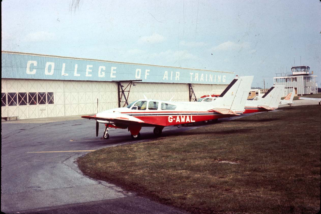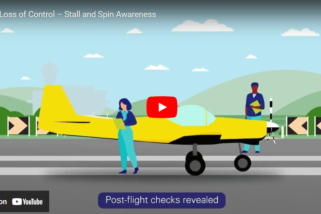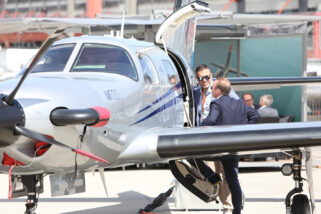Secretary of State for Transport, pilot and aircraft owner, Grant Shapps MP: After many years of being largely ignored by central Government, and occasional neglect and disinterest bordering on hostility, the UK General Aviation (GA) sector – and the aviation training industry that operates within it – is being offered a vision of a brighter future and imminent practical measures to help GA, from the Government department that is best-placed to make these changes.
The genesis for the new recognition of GA came in 2013 when Conservative minister Grant Shapps initiated the ‘GA red tape challenge’, an initiative to reduce the regulatory burden on General Aviation. Grant Shapps – himself an aviation enthusiast, private pilot and aircraft owner – proved to be an effective advocate for GA and soon the CAA formed a ‘GA Unit’ to deal specifically with General Aviation matters.
This initiative was followed in 2015 by the adoption of the ‘GA Strategy’ document as Government policy. The document stated that the policy aim was to make the UK: “…the best place in the world for GA as a flourishing, wealth generating and job producing sector of the economy”, and possibly for the first time in a Government document it recognised GA’s role in training future pilots and engineers, acknowledging that: “GA still accounts for nine tenths of our aircraft and over half of our pilots, it directly supports almost 10,000 jobs and indirectly nearly 30,000 more. These are skilled careers, including aerospace engineers, those involved in advanced avionics and those training the next generation of pilots”.
In 2017 Grant Shapps launched the All Party Parliamentary Group on General Aviation (APPG-GA), which has gone on to become the largest APPG in Parliament, with 208 parliamentary members (MPs and Lords), including 28 Privy Councillors, 16 former Cabinet ministers, 4 former Transport Ministers and one current Party Leader.
The APPG-GA has a number of working groups, has held a parliamentary enquiry into airspace policy and has lobbied Government and the CAA on GA matters. In the cabinet re-shuffle that Boris Johnson made after becoming Prime Minister in July 2019, Grant Shapps was appointed Secretary of State for Transport, and as such was required to resign his role as Chairman of the APPG-GA.
Given the huge and varied responsibilities of his new role, some wondered if he would be able to continue advocating on behalf of General Aviation. In late October, in a House of Commons committee room surrounded by the popular and political high drama of Brexit, Grant Shapps gave his answer.
The occasion was a ‘General Aviation Roundtable’, hosted by the Department for Transport (DfT) and briefed by Grant Shapps himself. The Secretary of State opened by announcing the creation of a new GA Division within the DfT.
FTN understands that the number of staff working on GA matters within the DfT has already risen from around 1.5 people, to about 20, with a ‘to-do’ list of at least 200 tasks and five core missions:• Policy Architecture – Working in partnership with the CAA to make the UK the best place in the world for General Aviation.
• Airspace Reform – A world leading airspace change process delivering an efficient, safe, interoperable and integrated airspace for all users.
• Land Use Planning – Protecting the strategic infrastructure network and assets of GA for the next generation.
• Skills and Technology – Inspiring the next generation of aviation professionals, incentivising innovation, making aviation diverse, inclusive and accessible.
• Regulation and Safety – Ensure regulation is proportionate and recognises the potential for delegation, deregulation and innovation.
Adding that Government hasn’t been promoting aviation as it should, it became clear from Grant that airspace and airfields will become a major focus for DfT policy. In the Queens Speech a few days before the ‘Roundtable’ meeting, the Government announced its intention to create new aviation legislation in the shape of the ‘Air Traffic Management and Unmanned Aircraft Bill’.
One of the proposed provisions of this bill is giving the Government: “..powers to direct an airport or other relevant body to prepare and submit a proposal to the Civil Aviation Authority to change the design of airspace.” Shapps explained that this clause addresses the current anomaly whereby the CAA has the power to approve Airspace Change Proposals to grant controlled airspace, but cannot require an airport to bring forward an Airspace Change to redesign, reduce or give-up controlled airspace.
Shapps was also able to reveal that the bill has already been presented in the House of Lords, the first step to bringing it into law.
…UK airspace is currently “…a broken, bust, system”
The newly created ‘Airspace Change Organising Group’ (ACOG), which the Government has tasked with coordinating the airspace changes needed to modernise the UK’s airspace, has also come under DfT scrutiny.
As a result, the ACOG Steering Committee will now have GA representation (which was noticeably missing at its inception) and a new remit to reduce the amount of controlled airspace.
Shapps drew particular attention to the size of the London TMA, when compared to controlled airspace around comparable airports in other countries and said that UK airspace is currently “…a broken, bust, system”. In later comments, Grant said: “I want to simplify airspace, make it more friendly to the training market, which I don’t think would disadvantage at all the commercial and business market. Actually they [commercial and business aircraft] just need to get up and away … instead it’s getting more and more complicated.”
Turning to airfields, Shapps re-iterated the intention to create a protected network of airfields and acknowledged the importance of safeguarding not just airfield sites themselves, but also the runway approaches. Whilst some progress has been made on planning issues, challenges remain.
Gordon Brown’s classification of airfields as ‘Brownfield’ sites opened the door to developers looking to turn airfields into housing estates, but a blanket re-classification of airfields as ‘Greenfield’ would hamper those airfields wishing to develop or improve their own facilities. More needs to be done, he agreed, to educate local authorities about current planning policy.
Regarding the long-running saga of the delay in approving GNSS (eg GPS) approaches … Shapps described the current situation as “outrageous”
Regarding the long-running saga of the delay in approving GNSS (eg GPS) approaches at GA airfields by the CAA, Shapps described the current situation as “outrageous”. He said that around 50 GA airfields in the UK would benefit from GNSS approaches and that funding would be provided to the CAA to get the approaches finally approved. He also held out the tantalising prospect of Government support for airfields, with the aim of improving airfield facilities.
He pointed-out that by its own figures the Treasury receives at least £10m a year from General Aviation, for example in AVGAS duty and taxes, and so it was time for some support in return.
Grant also spoke about reducing the costs of flight training in the UK, saying that flying and training costs in particular need to come down so that aviation can be more diverse.
Noting the pilot licencing trends published in the ‘Data & Stats’ section of Flight Training News, he highlighted the apparently declining trend of pilots trained in the UK, against the Boeing forecast of growing pilot demand over the next 20 years. Speaking about Electronic Conspicuity (EC), Grant voiced the desire that pilots should be able to adopt affordable EC at the earliest opportunity, with options being developed currently to support increased take up of EC devices.
He also re-iterated that the priorities of the new DfT GA division would be to make sure that the UK has an airfield network, to ensure that pilots are inspired to come into the sector and to have airspace that is available for them to actually do those things. “The way it’s been going has not boded well” he said.
Speaking to FTN after the meeting, Grant also confirmed that there is an overall desire at Government level for the UK seek close cooperative arrangements between the CAA and EASA.
He noted that the last Prime Minister said this and that the Political Declaration sets this out. He said that EASA itself is very concerned to have the UK stay and acknowledges that the UK is where a huge amount of expertise and knowledge comes from. On the subject of the costs of flight training, he said “We are considering a wider number of options for how we could reduce costs, and incentivise take-up, especially to help increase accessibility and diversity.”
Before returning to matters of state and the continuing Parliamentary Brexit spectacle, Grant offered a final thought: “We’ve got so much stuff to impart, the big picture is that a big change is coming to those struggling airports and airfields. We’re going to be offering more support, which I don’t ever recall happening for aviation, because we now recognise that if you’re an airfield, you’re an important part of this countries aviation future and we want to sustain you, we want to get you back on a level playing field and we want to help you grow.”







